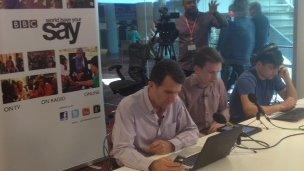Prospect of one-way Mars trip captures the imagination
- Published
- comments

The Mars trip has generated a lot of interest
Twenty years ago when scientists at Cern, external created the first page for the World Wide Web no one could have imagined how easily it would transform the ability of humankind to have conversations around the globe.
Nor could they have predicted that a web-based debate would have explored the apparently outlandish idea of volunteers travelling on a one-way ticket to Mars and setting up a colony with no prospect of return - all on live television.
The technology for that kind of space travel didn't exist back then. The TV show Big Brother hadn't been invented. And the three letters "www" were known to only a handful of people.
But on Tuesday afternoon, in a Google "hangout" - the first of this type of web-based dialogue to be hosted by BBC News - contributors from as far afield as Arizona, Paris and Mumbai shared their thoughts with us in London on a plan for an outpost where people would live - and die - beyond Earth.
The BBC asks a group of Mars applicants why they would want to live on the Red Planet
A Dutch organisation, Mars One, is seeking volunteers for a flight that would take them to the Red Planet and leave them there. The costs would be covered, it's hoped, by TV rights and corporate sponsorship.
Huge excitement
There is something about Mars that catches the imagination - its bloody colour, its role in mythology, the terrible track record of attempts to land on its distant and dusty surface, and the prospects of finding forms of alien life.
I checked with Bas Lansdorp, boss of Mars One, for the latest number of people to sign up so far: 30,000 people had paid the 30 euro deposit by the end of last week - and that number is probably far higher now.
Applicants' videos on his website capture an extraordinary level of excitement about the chance of making the journey. So what is it that drives people to want to leave this planet and risk everything on another?

Amy Shira Teital
We discussed that question with Melissa Ede, who describes herself as a transgender woman, and has signed up as a contender to be selected for the Mars One mission - "failure isn't in my vocabulary", she told us before the webcast.
For her, it was about excitement and the need to explore. "How do we know it's not possible?" she asked.
That was in response to comments I'd made about the very high number of very large obstacles that need to be overcome before anyone's boots will scuff the soils of Mars.
For a start, space is difficult and expensive. There aren't colonies on the Moon or Mars right now for a reason: the challenges and costs are huge.
The preferred rocket, Falcon Heavy, has to yet to be tested by its makers, SpaceX, even though the Mars One plan calls for the first demonstration flight to land on Mars in 2016.
A satellite is due to be parked above Mars in the same year to act as a relay for live TV pictures. A British firm, Surrey Satellites, confirms to me that it has been approached by Mars One but says it needs to be paid before researching the proposal.
Tight timings
The Mars One plan has incredibly tight timings - possibly unrealistically tight. Various contributors agreed on the sheer scale of the technological difficulties, including Rajat Agrawal, a technology writer in Mumbai, and Amy Shira Teitel, a space historian in Phoenix.
Ms Shira Teital said: "What if one of their supplies ships doesn't make it and they lose food? What's going to happen when vital parts don't make it or survive the trip? Is the crew going to eat each other? How much are we willing to make it a 'Lord of the Flies'-type situation if it all goes terribly wrong?"
Meanwhile, another communications system only made possible by the Web - Twitter - focused on the apparently appealing notion of using Mars One to rid the Earth of various people - usually politicians. One said: "You would never have to hear Justin Bieber again."
Others asked about the practicalities, often the grim ones. "What happens to the corpses?" asked one woman in a Tweet. Fair question, and thought-provoking: colonies need cemeteries.
There's always massive interest in Nasa's rovers on Mars - and robots like Curiosity are a very efficient way to explore the solar system. But there's nothing like the prospect of humans venturing there to spark excitement.
The half hour hangout passed incredibly quickly. I was reminded - by an email - of an earlier venture, Mars Express, the European Space Agency's spacecraft sent to orbit Mars.
I witnessed its launch from Baikonur in Central Asia in June 2003 - almost 10 years ago. It was an uplifting sight watching the rocket blaze its way through space and the mission was a success.
But the craft was also carrying a tiny lander, the British Beagle-2, which was designed to touch down and search for signs of life. On Christmas Day, 2003, we waited for a signal - and waited and waited. The Beagle had crashed.
Imagine the risks of a manned mission to Mars, and the tension of a landing. If it gets off the ground - and it's a very big if - Mars One would provide irresistible viewing. And a lot more for us all to talk about.